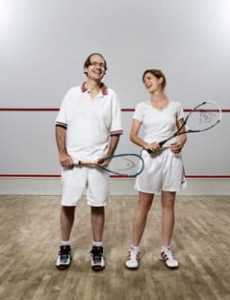The pain and pleasure of mixing it on court with the top guys (it hurts)
By CASS R. SUNSTEiN – Squash Mad Guest Correspondent (courtesy of Bloomberg View)

Remember George Plimpton’s classic book, “Paper Lion”? In the 1960s, Plimpton decided to find out what would happen if an ordinary person tried to play professional football. Amazingly, the Detroit Lions agreed to give him a tryout, allowing him to come to training camp as a third-string quarterback.
The result? Disaster. As human beings go, Plimpton was a pretty good athlete. But as professional athletes go, he couldn’t throw, he couldn’t run, and he couldn’t take a hit. Allowed to play quarterback in a scrimmage, he fumbled, he fell down, and he couldn’t complete a pass. He couldn’t even hand off the ball.
Nevertheless, his tale was hard to resist. On behalf of all of us, he posed the question: Suppose you had the chance to play a professional sport. What can the pros do that you can’t? What’s the distance between you? If you were ever an athlete — even in high school or college – there’s probably a part of your brain that says, “Coach, just put me in! I can do it!”
Plimpton’s conclusion? You really can’t.
A few days ago, I followed in his footsteps.
Not, thank goodness, on the football field. My sport is squash — played with a racquet and a small ball in an indoor court. No one is trying to knock you down, but the game is physically demanding, and the ball can go up to 176 miles per hour (that’s Cameron Pilley’s world record speed).
At the professional level, Pakistan long dominated the sport, which is now led by players from Egypt and the U.K., though the current number one, Greg Gaultier is French. The top-ranked American, Julian Illingworth, is 55th.
If you have time on your hands, and look all the way down the long list of professional players, you’ll eventually come to the bottom-ranked American. That’s me.

Now, I’m not exactly a newcomer to squash. I played in college, and our team managed to win the national title. But that was college squash, not professional, and our glory year was 1976 — about 10 years before today’s older professional squash players were born.
In the past few years, I’ve been playing pretty regularly, and I made it onto a local team in Washington, D.C.
As a result of a series of small miracles, I was invited to compete in (pause for dramatic effect) the Squash Revolution National Capital Open 2014.
To be sure, it was just the qualifying rounds, and I was a humble local qualifier — privileged to compete against the genuine professionals on the sport’s world tour, but not actually one of them.
Nonetheless, Plimpton’s questions remained: What would happen? Aren’t sports the great equalizer?
 In the first round, I was scheduled to play Umar Balaj Malik, a 20-year-old from Pakistan. I had only one chance: Maybe Umar wouldn’t show up? He didn’t show up! (Visa problems, apparently.)
In the first round, I was scheduled to play Umar Balaj Malik, a 20-year-old from Pakistan. I had only one chance: Maybe Umar wouldn’t show up? He didn’t show up! (Visa problems, apparently.)
Onto the next round, where I faced Mubarak Mohsin, another 20-year-old from Pakistan, ranked a lot higher than Malik. He showed up. Watching him hit the ball during our warm-up — with such power, grace and effortlessness — I felt my arms grow heavy. (Has anyone in the history of the world dropped out of a sports competition because of exhaustion during warm-up?)
To read the rest of the article on Bloomberg View, please click here
Esquire interview with Cass Sunstein here
